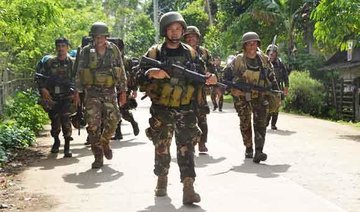MANILA: Philippine President Rodrigo Duterte declared martial law Tuesday on the southern island of Mindanao, where security forces have been battling Daesh group-linked militants, his spokesman said.
“As of 10 p.m. Manila time Duterte has declared martial law for the entire island of Mindanao,” spokesman Ernesto Abella said in a nationally televised briefing from Moscow where the president was on an official visit.
Philippine troops and police were battling dozens of gunmen protecting one of the world’s most wanted Islamic militants in a built-up area of a southern city on Tuesday, authorities said.
At least one policeman was killed in the hunt for Isnilon Hapilon, a leader of the infamous Abu Sayyaf kidnap gang and Philippine head of the Daesh group, according to Philippine military chief of staff General Eduardo Ano.
The fighting took place in Marawi, a mostly Muslim-populated city of about 200,000 people on the southern island of Mindanao, with the gunmen attacking a hospital during the clashes, Ano told CNN Philippines.
“Please advise people to stay inside their houses. We will clear the area,” Ano said.
He said the fighting began when police and troops raided a house on Tuesday afternoon where Hapilon, the subject of a US State Department bounty of $5 million, was believed to be hiding.
This triggered fierce clashes throughout the afternoon and into the evening, with Ano estimating there were about 50 gunmen.
Photos posted on social media by Marawi residents showed the gunmen walking through the streets of Basak, a Marawi suburb of about 1,700 people.
A woman who asked not to be named told AFP by text that she saw about 10 armed men take up positions at the gate of a government hospital.
Police clashed with the gunmen near the hospital, leaving one officer seriously wounded and one of the extremists dead, she added.
The military said it could not confirm the militant’s death. Ano said eight security personnel had been injured in the clashes.
Kidnap-for-ransom gangs
The Abu Sayyaf, based on the most southern islands of Mindanao, has kidnapped hundreds of Filipinos and foreigners since the early 1990s to extract ransoms.
The militants beheaded an elderly German early this year and two Canadians last year after ransom demands were not met.
It has also been blamed for the country’s worst terrorist attacks, including the 2004 bombing of a ferry in Manila Bay that claimed more than 100 lives.
The US State Department bounty for Hapilon was offered following alleged terrorist acts against US citizens, including the 2001 kidnapping of three Americans in the western Philippines — two of whom were later killed.
Security analysts say Hapilon has been trying to unite Filipino militant groups that have professed allegiance to Daesh.
These include the Maute group, which is based near Marawi, hundreds of kilometers to the north of the Abu Sayyaf strongholds.
The Maute group has engaged in repeated deadly battles with the military over the past year in rural areas around Marawi.
The International Committee of the Red Cross, which has an office near Marawi and operates in the area, voiced alarm that civilians may get caught up in the fighting.
“We are extremely concerned about the impact of the ongoing hostilities in Marawi City on the civilians,” the head of the ICRC’s Philippine delegation, Pascal Porchet, said in a statement.
“We urge all parties to the conflict to spare civilians and respect civilian property, such as hospitals and schools, in fulfullment of their obligations to respect international humanitarian law.”
The Marawi fighting came six weeks after the military foiled a mass kidnapping attempt by the Abu Sayyaf on the central resort island of Bohol.
The US and other Western governments warned this month that terrorists plan to kidnap foreigners in tourist hotspots across the central and western Philippines.
























